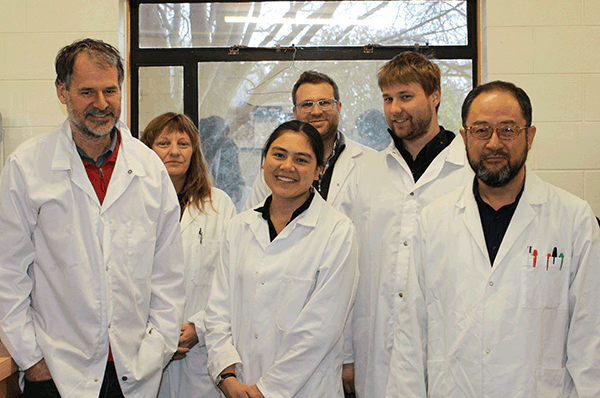Hitchhiking bacteria may be key to contaminant clean-up
Research findings published in leading science journal
Lincoln Agritech Biotechnology Group (from left) Dr Richard Weld, Dr Johanna Steyaert, international intern Camille Vagner, Nicholas Glithero, PhD student Thomas Flinois, and Simon Lee. Photo: Lincoln Agritech.
Lincoln Agritech researchers and collaborators from various institutions in France have discovered a novel symbiosis involving a hitch-hiking magneto-sensing bacteria riding on the outer membrane of marine protists (microscopic single-celled organisms) found in sediment on the bottom of the Mediterranean Sea.
The protists are enabled by the bacteria, identified as Deltaproteobacteria, to orientate themselves in response to the Earth’s magnetic field, but they can also be controlled with magnets the scientists observed in the lab. The findings are important as this is the first description of a highly unusual symbiotic association between a protista and a magnetic bacteria, the only known symbiosis involving magnetotaxis. Potentially, this could eventually offer a unique way to remove contaminants from manufacturing processes.
In 2017, Lincoln Agritech’s Biotechnology Group was awarded a two-year Smart Ideas contract from the Ministry of Business, Innovation and Employment (MBIE) Endeavour Fund to investigate the biology and biotechnology applications of magnetotactic bacteria (MTB).
MTB have organelles containing magnetic crystals that allow them to move in response to the Earth’s magnetic field, they employ this capability to navigate.
The magnetotactic response also offers biotechnologists a unique system that can be exploited to control the bacteria.
The research was led by Lincoln Agritech’s, Dr Richard Weld, and has recently been published in the well-respected Nature Microbiology journal.
These findings have prompted wider interest and have featured in Science and appeared in the French national newspaper, Le Monde.
Other resources and information
Check out this Science YouTube clip of the jiggling protists.
Reference
Monteil, C., Vallenet, D., Menguy, N., Benzerara, K., Barbe, V., Fouteau, S., Cruaud, C., Floriani, M., Viollier, E., Adryanczyk, G., Leonhardt, N., Faivre, D., Pignol, D., López-García, P., Weld, R. & Lefevre, C. (2019). Ectosymbiotic bacteria at the origin of magnetoreception in a marine protist. Nature Microbiology 4, 1088–1095. doi:10.1038/s41564-019-0432-7
Date posted: 21 June 2019

